Industry-Academic Collaboration Workshop
Industry Academia Collaboration (IAC) Workshop: RoundTable Discussion
About Program
The Industry-Academia Collaboration (IAC) workshop aims to strengthen the collaborative effort between TalentCorp, industry players, academicians, and professional bodies. The IAC workshop platform will be conducted via focus group discussions to gather insights and feedback from IAC stakeholders on talent matters, particularly in identifying current challenges and issues faced by the industries across economic clusters.This workshop aims to be an industry-driven initiative, to co-ordinate a solution-focused networking platform for industry and academia, to create awareness on the importance of IAC whilst providing a strategic media presence for the participants, bridge gaps in talent matters and be a foundation to develop the TalentCorp’s Malaysian Talent Insights (MTI) document and Kajian Relevansi Program Akademik by the Ministry of Higher Education.
Industry-Academic Collaboration Workshop
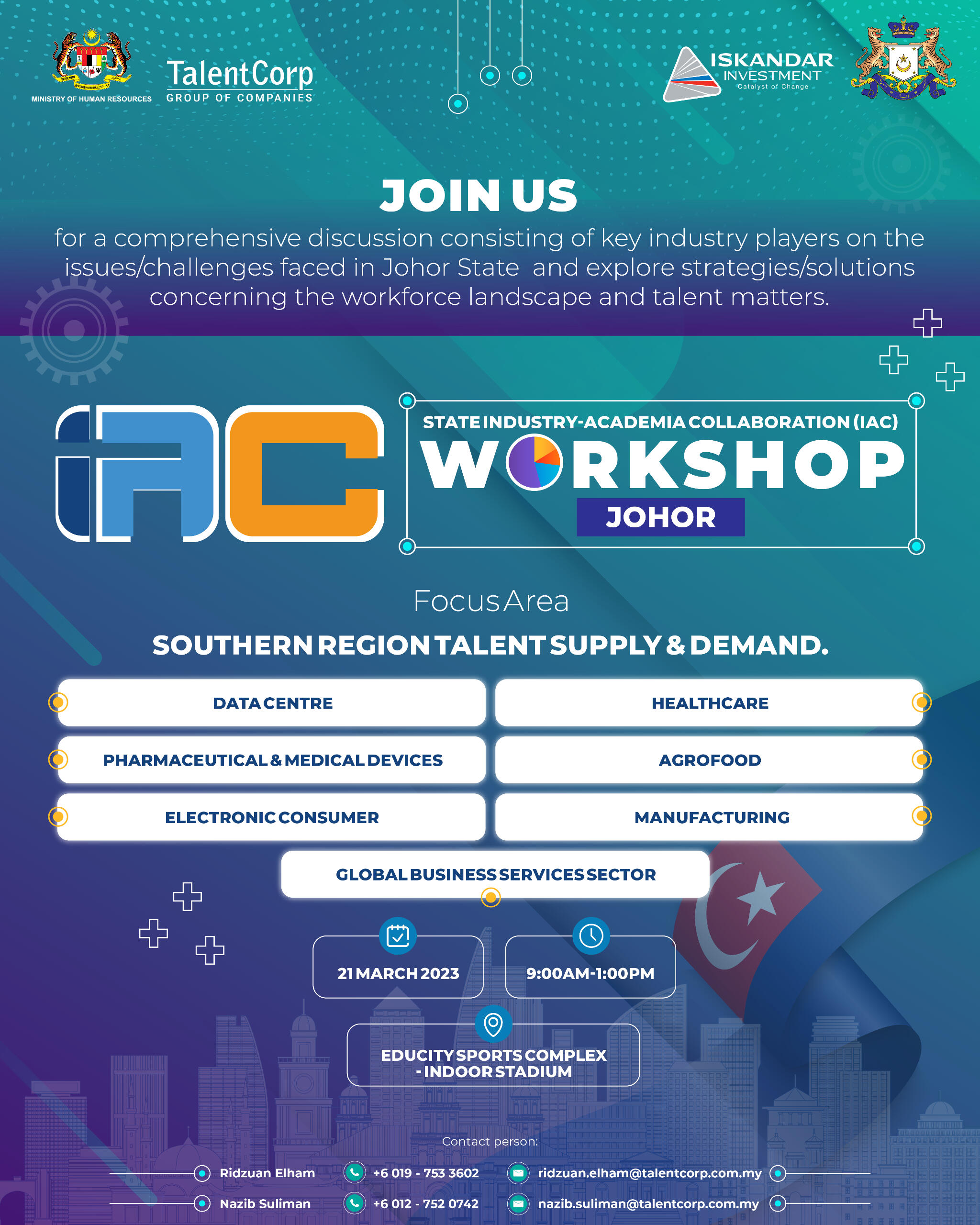
IAC Workshop 1 : Johor
21 March 2023
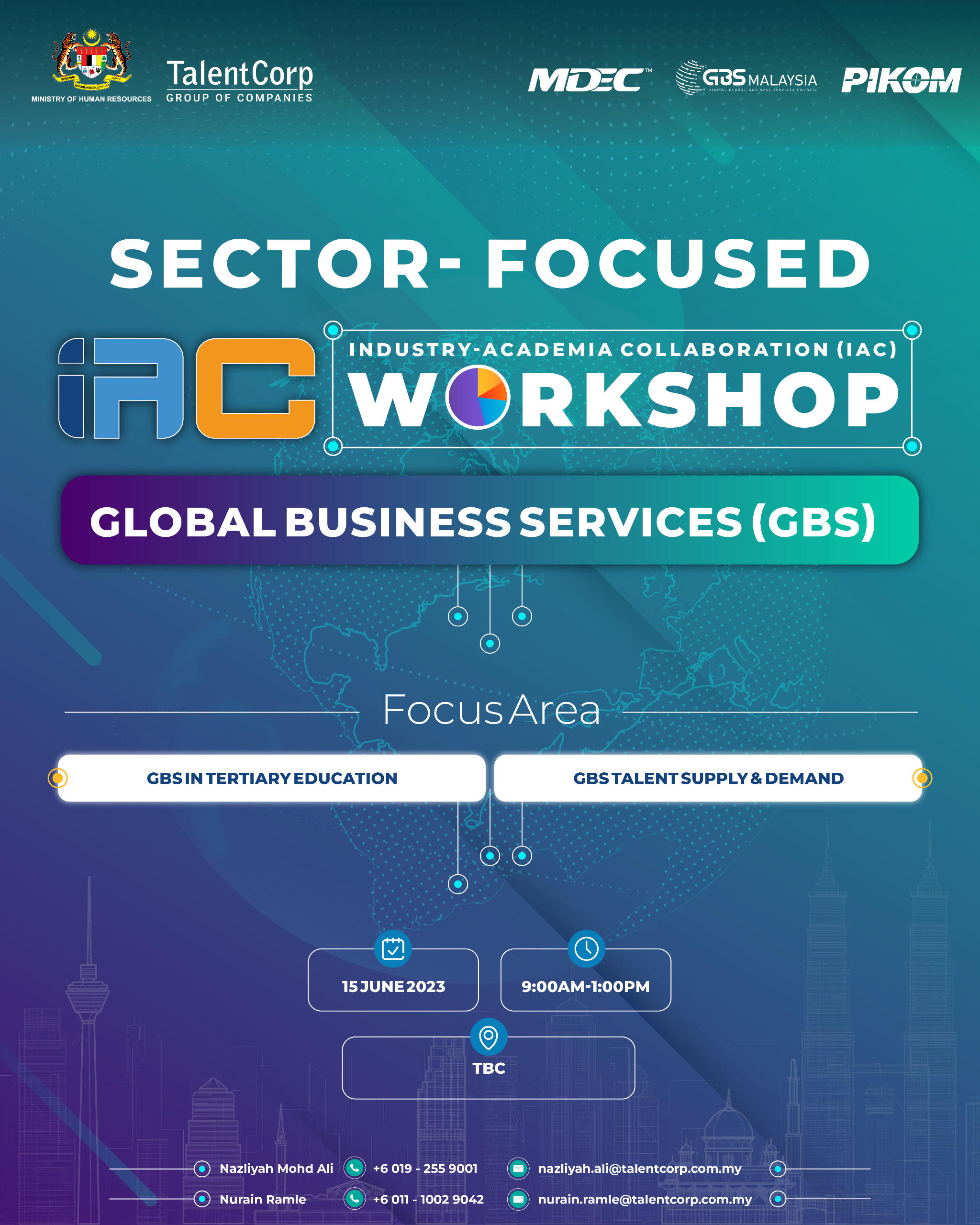
IAC Workshop 2: Global Business Services (GBS)
15 June 2023
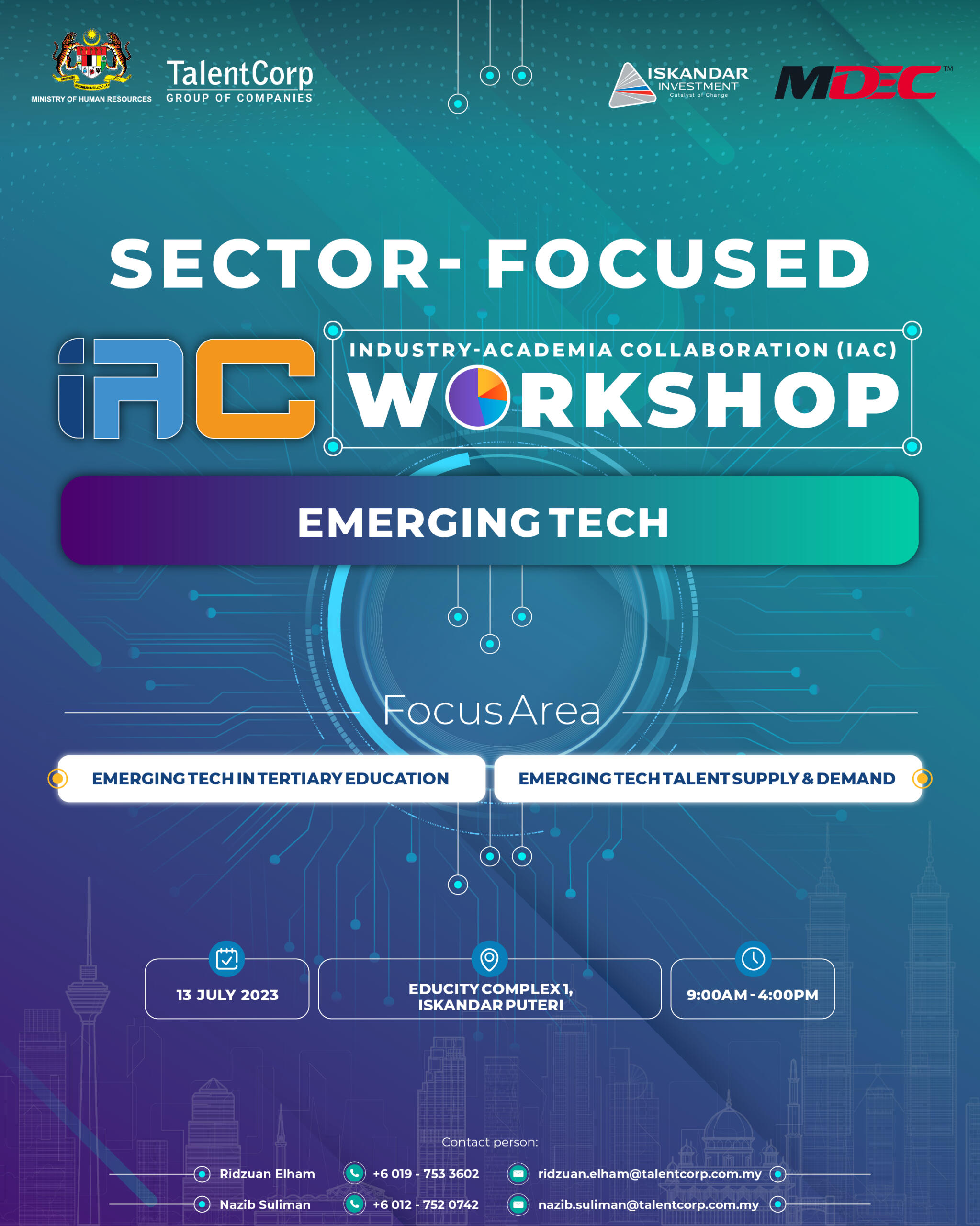
IAC Workshop 3: Emerging Technology
13 July 2023

IAC Workshop 4: SME Northern Region
05 September 2023
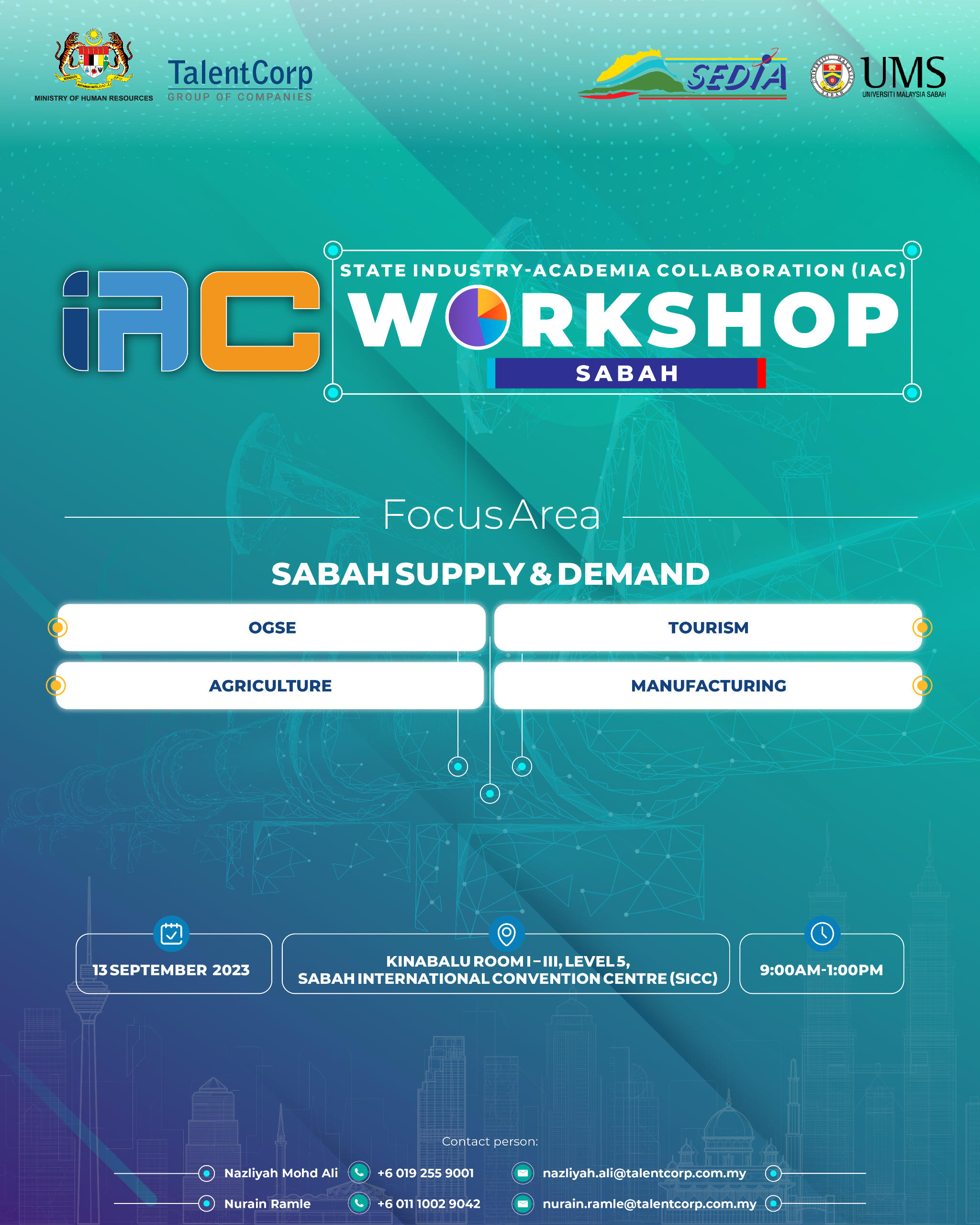
IAC Workshop 5: Sabah
13 September 2023
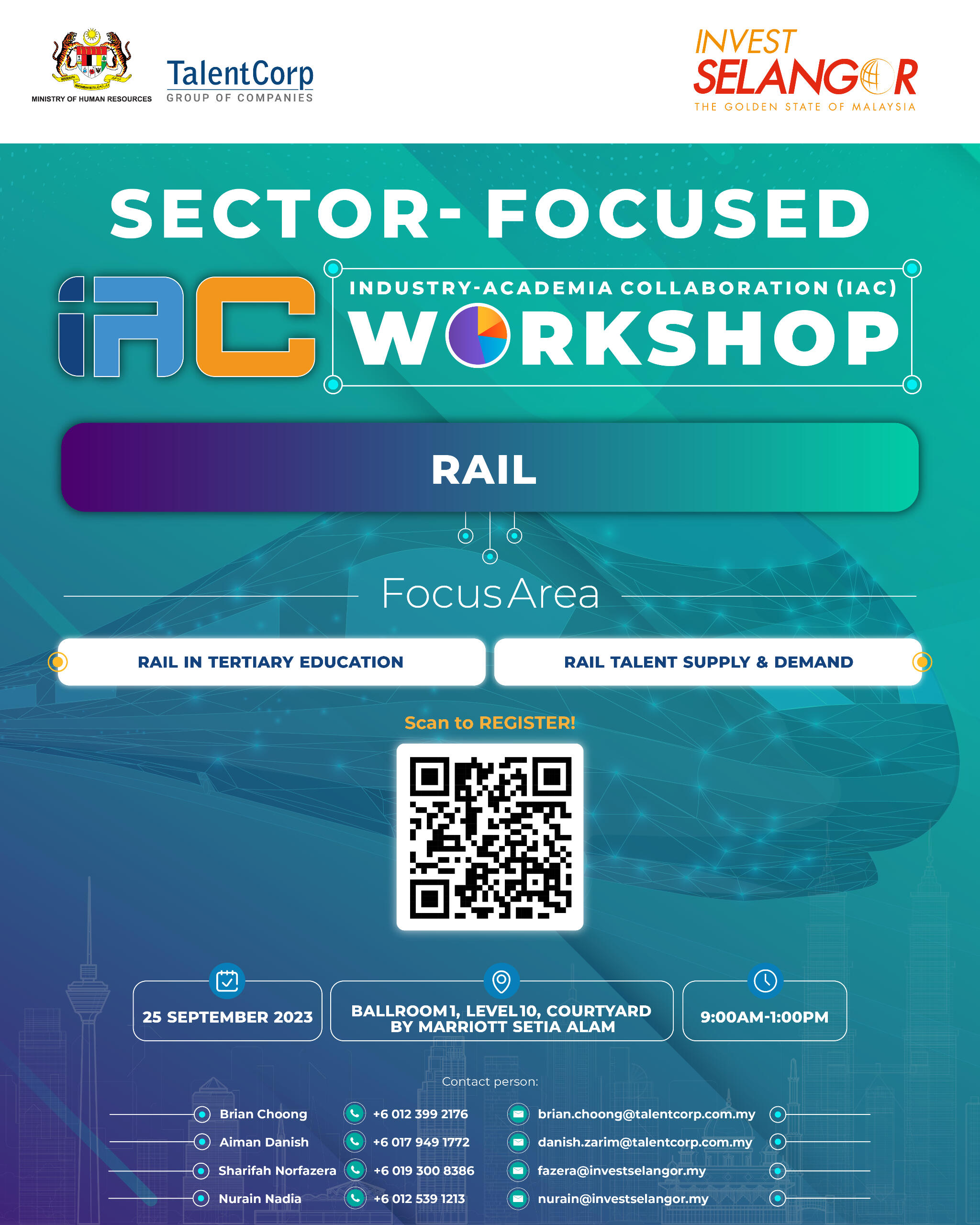
IAC Workshop 6: Rail
25 September 2023

IAC Workshop 7: Negeri Sembilan
24 October 2023
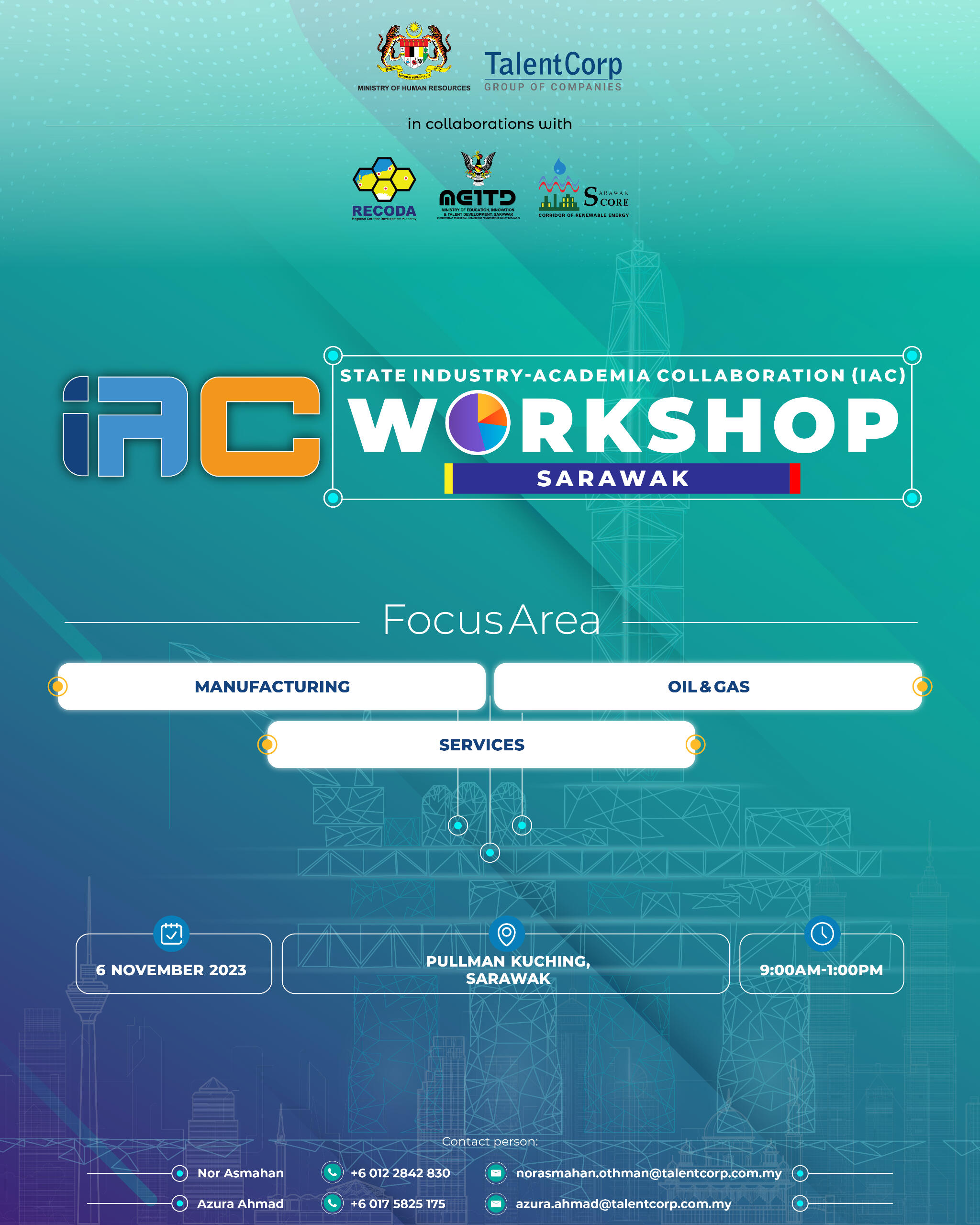
IAC Workshop 8: Sarawak
16 November 2023
IAC Workshop 1 : Johor
Johor is the southernmost state in Malaysia, strategically located next to Singapore and with connectivity to every financial capital in Asia within 12 - 8 hours flight, including cities in China and India. Economically, it is one of the fastest growing states in the country with GDP growth of 5.5% between 2010 to 2020 and currently the top investment destination in Malaysia.In 2022, the state attracted RM70.6 billion in foreign direct investment, around 33% of the total national investment during the period which stood at RM193.7 billion. The services sector dominates at RM55.06 billion, followed by the manufacturing sector with RM8.84 billion, and the primary sector with RM25 million. A total of 340 projects were approved by MIDA, while the number of job opportunities expected to be created through these investments would be 11,968.
Johor is being positioned to accommodate investment in the digital, medical devices and advanced
manufacturing as well as related support industries. The provision of quality and highly skilled human capital, political stability and adequate utilities, land and infrastructure and good basic amenities are amongst the main factors for the positive performance.In recent years, it has emerged as a key destination for data centres amidst the growing demand for cloud services in the region. It also has thriving agriculture sector with oil palm, rubber, vegetables, and cocoa being the major crops that contribute to the nation’s overall production and export earnings. The state is actively promoting to develop and adopt latest technology to enhance yield, improve food security and foster innovation for the sector.Johor has increasingly become an important destination for medical tourism. Its modern healthcare services equipped with state-of-the-art devices are competitively positioned as compared to neighbouring countries. Both the State and Federal governments are collaborating to improve the healthcare services via critical infrastructure development, training program for health workers and other various initiatives to attract investment.Talent, one of the key enablers in any economy, is critical to facilitate growth and to attract investments, particularly in high value sectors. There is a need for a renewed approach and concerted effort in ensuring the availability of talents with specific skill sets in Johor in responding to its promoted sectors.TalentCorp, as an agency driving the talent development agenda, is working closely with all relevant stakeholders to bridge the gap between industry and academia. The input and feedback gathered from both industry players and institutions are critical in mapping out the talent needs and in identifying suitable interventions required by both parties. Through such collective work, immediate and long-term yet localised solutions are being co-created to address the real issues and challenges within the state.
IAC Workshop 2: Global Business Services (GBS) Workshop
The GBS industry has witnessed a rapid digital transformation, leveraging technologies like robotic process automation (RPA), artificial intelligence (AI), machine learning (ML), and data analytics. These technologies automate repetitive tasks, improve accuracy, and enable data-driven decision-making, thereby enhancing operational efficiency and reducing costs.Global Business Services sector is a dynamic and rapidly evolving industry that provides essential support functions to businesses worldwide. It leverages technology, global talent, and economies of scale to optimize operations, drive efficiency, and enable organizations to focus on strategic priorities. As companies continue to seek operational excellence and cost optimization, the GBS sector is poised to play an increasingly vital role in the global business landscape.However, the talent pool is becoming a concern for these sectors as they strive to meet the demands of a competitive market. To overcome this challenge, there is a need for collaboration between the government, industry, and academia. Therefore, TalentCorp as a facilitator in identifying talent-related solutions, will be organising an Industry-Academia Collaboration workshop with aim to gather input and feedback from industry players and academia on potential intervention programs and solutions overcome the talent issues and challenges
IAC Workshop 3: Emerging Technology
In 2023, the Emerging Technology sector in Malaysia is poised for significant growth. Despite global economic challenges, Malaysia is becoming a rapidly developing center for digital technology and high-tech manufacturing. This growth is expected to be mirrored by a 5.1% increase in global technology investment. The projected growth in tech investment will likely impact the real estate sector, with new demand expected in the manufacturing, logistics, and alternative commercial property sectors. In 2021, the digital economy accounted for about 23% of Malaysia’s GDP, and by 2025, it is expected that one out of every four Ringgit earned in Malaysia will be in the digital economy.The growth of the technology industry in Malaysia is largely driven by the talent pool. Eight of the top ten emerging jobs in the country require digital technology skills, including data analytics, data science, the internet of things, digital transformation, and cybersecurity. AI and deep learning technology are likely to become popular trends in Malaysia’s business sectors in 2023. These technologies have the potential to drive innovation and improve efficiency in a range of industries, including healthcare, finance, and manufacturing. The Malaysian government has plans for incorporating AI into the economy through the Malaysia Artificial Intelligence Roadmap 2021-2025 (AI-Rmap) and the Malaysian Digital Economy Blueprint (MDEB)
IAC Workshop 4 : SME Northern Region
The Small & Medium Enterprises has always been positioned as the most strategic sector with a tremendous economic impact on Malaysia. SME comprises of 97.4% of total business in Malaysia and continuously be the main engine to drive the economy. Understanding the challenge faced by this sector, TalentCorp’s IAC was developed to deep dive and understand roadblocks and challenges, especially in talent supply and demand. It also further strengthens collaborative effort between TalentCorp, industries, academia, and professional bodies to bridge gaps in the talent ecosystem.
Reflecting on the talent landscape, SMEs continued to play a crucial role, contributing significantly to Malaysia's employment sector. In 2022, SMEs accounted for 48.2 percent of total employment, up from 47.8 percent in 2021. Demonstrating remarkable growth, the number of individuals employed by SMEs rose by 3.8 percent, reaching an impressive total of 7.59 million persons. Notably, the Services sector witnessed a robust expansion in its employment domain, surpassing the 50 percent mark of total sector employment in 2022, reaching 50.1 percent. This sector's strength was further highlighted by a 5.3 percent increase in employment, bringing the total to 4.87 million individuals.In the dynamic realm of Malaysia's economy, the year 2022 witnessed an impressive ascent for the country's Small, and Medium Enterprises (SMEs), as their Gross Domestic Product (GDP) surged by an impressive 11.6 percent. This remarkable achievement not only outpaced the overall national GDP growth of 8.7 percent but also underscored the escalating role of SMEs in propelling economic expansion. A clear testament to this trajectory is the substantial augmentation of SMEs' contribution to the GDP, which escalated to 38.4 percent. This growth translated into a notable economic value, with an increase from RM520.0 billion in 2021 to a substantial RM580.4 billion.The bedrock of this accomplishment lies in the Services and Manufacturing sectors, which remain the principal drivers of SMEs' GDP, accounting for an impressive 84.6 percent share. In particular, the Services sector rallied back, surging by 16.4 percent. This resurgence was bolstered by notable achievements within sub-sectors such as Wholesale & Retail Trade, Food & Beverages, Accommodation, and Finance, Insurance, Real Estate & Business Services.Emphasizing the global connectivity of Malaysian SMEs, the exports of these enterprises reached a significant milestone, totaling RM144.5 billion in 2022. This marked a substantial expansion of 16.3 percent, with the Manufacturing sector playing a pivotal role by contributing 19.5 percent growth. Additionally, the Services sector also staged a remarkable comeback with a 5.7 percent rebound. Impressively, these SME exports constituted 10.5 percent of the total exports for the year.Within the Services sector, exports soared to RM27.7 billion, propelled by key components including Other Business Services, Transportation, Telecommunications, and Computer & Information Services.In the captivating narrative of Malaysia's economic landscape, SMEs shine as integral players, steering the nation's growth trajectory through their exceptional contributions to GDP, exports, and employment.
IAC Workshop 5: Sabah
In 2023, the tourism sector in Sabah is expected to expand significantly. Sabah, the second-largest state in Malaysia, is a must-visit destination for nature, environmental, and adventure enthusiasts1. The Sabah Tourism Board (STB) is promoting Sabah as the world’s premier ecotourism and nature adventure destination1. The state government is working on expanding paddy farming from 24,000 to 30,000 hectares to increase rice Self-Sufficiency Level (SSL) from 22.08 to 30 per cent2. The Sabah government has allocated RM813.56 million under the state’s Budget 2024 for the development and growth of the three key sectors of agriculture, industries and tourism3.The manufacturing sector in Sabah has shown significant improvement, moving to fifth place in 2023 compared to eighth place in 20214. The industrial sector, especially manufacturing-based, would be given focus to become a catalyst in generating more employment opportunities for the people5. The Sabah International Expo (SIE) is Sabah’s Premier Trade Fair and a Sabah State Government sanctioned biennially event held in the beautiful City of Kota Kinabalu, Sabah, Malaysia6. The Sabah government is making efforts to increase the output and quality of agricultural products to ensure that the state’s self-sufficiency level (SSL) would continue to increase3. The efforts included implementing several initiatives to boost the rice SSL from 22 per cent this year to 31 per cent in 2025In summary, Sabah is a state that is rapidly developing in various sectors. The tourism sector is flourishing, with the state being promoted as a premier ecotourism and nature adventure destination. The manufacturing sector has shown significant improvement, moving up in the national ranking and generating more employment opportunities. The agricultural sector is also being given a boost, with initiatives to increase the output and quality of agricultural products, particularly in rice production. The state government’s allocation for the development of these key sectors under the state’s Budget 2024 further underscores their commitment to growth. These developments position Sabah as a state with a diverse and growing economy.
IAC Workshop 6: Rail
The rail industry in Malaysia has evolved into a vital component of the nation's transportation infrastructure, with significant contributions to economic development and sustainability. It can be said that within Malaysian rail industry, key aspects highlighted are ridership statistics, talent development, its impact on GDP and the economy, and the exciting prospects for future development.The Malaysian rail network has experienced substantial growth in recent years, with ridership figures reflecting its increasing popularity. In 2021, the nation's rail systems transported over 71 million passengers, a notable increase from previous years. This surge in ridership can be attributed to the efficiency, reliability, and affordability of rail travel, as well as the expanding network that connects various regions of Malaysia.The Malaysian government has demonstrated a strong commitment to talent development within the rail industry. With more than 80,000 individuals employed in the sector, the workforce is well-equipped with the necessary skills for designing, constructing, operating, and maintaining rail infrastructure. Institutions and training programs such as Malaysia Rail Academy by KTMB, UniKL’s Bachelor of Engineering in Rail Industry & many more have been established to ensure a continuous supply of skilled professionals, fostering innovation and ensuring the industry's sustainability.The rail industry's influence on Malaysia's GDP is significant, contributing approximately 1.2% to the nation's economic output. Beyond this direct economic contribution, the industry has indirect effects on various sectors, such as manufacturing and tourism, by enhancing connectivity and accessibility. The construction and maintenance of rail networks also stimulate economic activity and job creation, boosting local economies along the routes.The future of the Malaysian rail industry appears promising, with ambitious plans for expansion and modernization. Projects like the High-Speed Rail linking Kuala Lumpur and Singapore, the East Coast Rail Link, and the Klang Valley Double Tracking project signify the government's commitment to improving rail connectivity and efficiency. These developments not only enhance domestic transportation but also have the potential to promote international trade and tourism.The rail industry in Malaysia stands as a beacon of progress, efficiently connecting people and places while contributing significantly to the nation's economic growth. With continuous investment in talent development, the industry is poised for further expansion and innovation. As Malaysia advances its rail infrastructure, it will not only bolster the economy but also promote sustainability, positioning itself as a model for modern and efficient transportation systems in the region and beyond.
IAC Workshop 7: Negeri Sembilan
In 2023, the Automotive & EV sector in Negeri Sembilan is expected to see significant growth. Tesla has announced plans to install Superchargers in several locations in Peninsular Malaysia, including Negeri Sembilan. Additionally, Nexperia Malaysia Sdn. Bhd., a subsidiary of Nexperia BV (Netherlands), is planning to expand its presence in Malaysia with a new facility in Seremban, Negeri Sembilan. By 2026, Nexperia Malaysia is looking to invest an additional RM1.6 billion for building, equipment, and automation in Malaysia.The E&E & Semiconductor sector is also set to expand. The National E&E Forum 2023, organized by the Malaysia Semiconductor Industry Association, is expected to be a groundbreaking event for the semiconductor industry. Nexperia Malaysia is also planning to ramp up chip production with a new production facility in Negeri Sembilan.The Food & Beverages sector in Negeri Sembilan is also expected to grow. Mahsuri Food Sdn Bhd is investing RM250 million to open a new manufacturing plant in Bandar Enstek, which is scheduled to be fully operational in early 20256. The Taste Fully Food & Beverage Expo 2023 in Kuala Lumpur will feature a variety of food and beverage products, including poultry, meat, dairy products, chilled and frozen foods, fresh produce, and seafoodIn Summary, Negeri Sembilan is set to experience significant growth in its Automotive & EV, E&E & Semiconductor, and Food & Beverages sectors, becoming a hub for the automotive industry and a growing economy.
IAC Workshop 8: Sarawak
In 2023, the Manufacturing sector in Sarawak is expected to see significant growth. The state has witnessed a surge in the export of machinery, equipment, and intermediate goods. Approved investments in the manufacturing sector, particularly within the electrical and electronic industry, are also on the rise. The state government has allocated RM7 million for InvestSarawak, an entity to attract foreign direct investments (FDI) into the state. This is expected to drive in local and foreign investors to uplift the state’s economy.The Oil & Gas sector in Sarawak is also set to expand. Petroliam Nasional Bhd (Petronas) will continue to work with the Sarawak state government to develop its oil and gas resources. The state is a major contributor to the oil and gas revenue to the federal coffers. The Russia-Ukraine conflict, which has pushed up oil prices, has cushioned the impact on Malaysia’s economy with Sarawak oil and natural gas4.The Services sector in Sarawak is expected to grow as well. The proposed 2023 Sarawak Budget is expected to generate a surplus of RM238 million, given projected revenue of RM11.035 billion and total ordinary expenditure of RM10.797 billion. The budget is an expansionary one that invests in infrastructure to a great degree and has the well-being of the people at its core.In summary, Sarawak is poised for significant growth in its Manufacturing, Oil & Gas, and Services sectors in 2023. The state is becoming a hub for the manufacturing industry with the surge in the export of machinery, equipment, and intermediate goods. The Oil & Gas sector is set to expand with the continued collaboration with Petronas. The Services sector is also expected to grow with the proposed 2023 Sarawak Budget. These developments position Sarawak as a state with a diverse and growing economy.
Enim amet turpis
Morbi tristique senectus et netus et malesuada fames ac turpis egestas. Curabitur amet sapien risus, commodo eget convallis enim turpis, lorem ipsum dolor sit amet nullam.


Aliquam et feugiat
Morbi tristique senectus et netus et malesuada fames ac turpis egestas. Curabitur amet sapien risus, commodo eget convallis enim turpis, lorem ipsum dolor sit amet nullam.
Risus aliquam
Morbi tristique senectus et netus et malesuada fames ac turpis egestas. Curabitur amet sapien risus, commodo eget convallis enim turpis, lorem ipsum dolor sit amet nullam.

Consequat lorem amet lorem ipsum nulla
Sed malesuada fames ac turpis egestas. Curabitur sapien risus, commodo eget turpis at, elementum convallis enim turpis, lorem ipsum dolor. Sed amet nisl tempus. lacinia malesuada et a elit. Donec urna ex lacinia.
We Are Updating This Page
Thank you for your interest! We are still updating this page. Please check again soon

